After Moving In With Her BF, Redditor Discovers How Lazy And Irresponsible Her BF Is, He Made Her The Primary Provider And Caretaker Of His Dog
It's normal to imagine your future with someone if you are in a serious long-term relationship. It's safe to assume that your relationship is headed toward marriage if that is what you both agree upon.
Nothing, however, is set in stone, and plans like that can fall apart just as quickly as we pictured them. For this couple, it started when they moved in together.
OP and her boyfriend had been dating for two years before they moved into a fifth-floor apartment together. Her boyfriend had been a dog owner for four years, while OP had had her dog for ten.
They each were responsible for their dogs prior to living together, but that system fell apart once they shared an apartment. In the early days of bliss, they walked the dogs together before and after work — OP went the extra mile and went home during her lunch breaks to walk the dogs again.
Six months later, the routine slowly changed, and OP is now solely responsible for both dogs' daily walks. OP's boyfriend said he is too tired from work to join them, and once he goes up the stairs, he won't be coming down.
The trouble is that they don't live in the safest neighborhood, and walking dogs at night alone as a woman can be dangerous. OP has been approached several times by strangers during these walks, and she told her BF about it.
He dismissed OP's concerns and said she is overreacting. He reassured her that their two gentle and sweet dogs will defend her if need be.
OP has also been feeding the dogs by herself. She also pays for the dog food, which costs her roughly $80/month

When they went for a hike and her BF's dog slipped on an embankment, OP paid for the vet bill. Her BF said he won't pay her back since they live together.
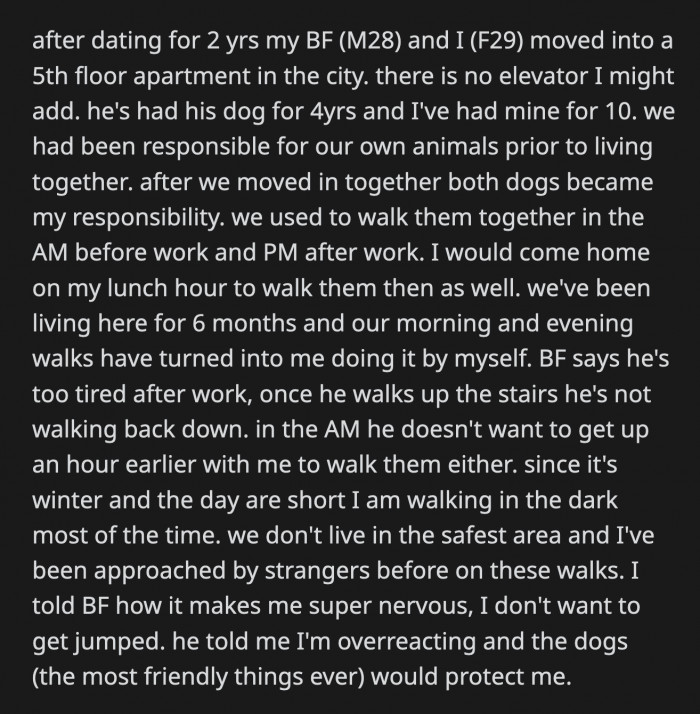
OP had enough soon after
OP didn't take the dog out for their usual morning walk. Twenty minutes later, her BF was out walking the dog.
OP thought the problem was solved, but he returned to his old ways. He went to work without taking the dog for a walk — OP saw that the dog had peed when she got back to the apartment.
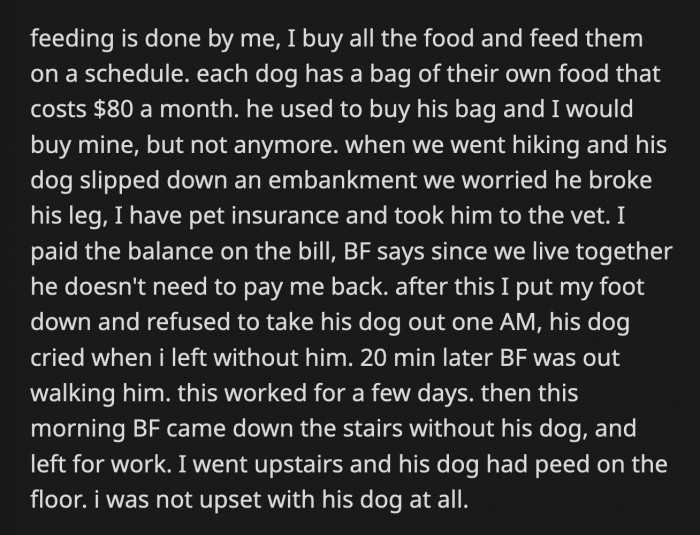
Exploring Relationship Dynamics
Dr. Emily Carter, a relationship psychologist at Stanford University, explains that the dynamics reflected in this scenario often stem from unspoken agreements within the relationship.
Her research emphasizes that partners in cohabiting situations may inadvertently assume traditional roles based on societal norms, which can lead to resentment if not discussed openly.
This often results in an imbalance of responsibilities, where one partner feels overwhelmed and taken for granted.
The Dynamics of Relationship Responsibilities
Psychologists note that relational dynamics often shift after moving in together, which can lead to imbalances in responsibilities.
Research from Yale University indicates that partners may unconsciously fall into traditional roles, affecting their perceptions of fairness and obligation.
When one partner assumes the majority of caregiving tasks, it can create resentment and feelings of inequity.
Her boyfriend also neglected to feed his dog or even clean the mess from the floor
They had a fight when he got home. He called OP rude and a b*tch for not taking care of his dog.
He said OP was being cruel to his dog. He argued that it shouldn't be a problem since she was taking her dog out for a walk anyway.
His reason for not helping her was his laborious job. He said he deserves to come home, relax, and do nothing after a long day at work.
OP doesn't know how to proceed because she doesn't want either of the dogs to suffer. She loves both of them and wishes them no harm, but she also doesn't want her boyfriend to continue his irresponsibility.
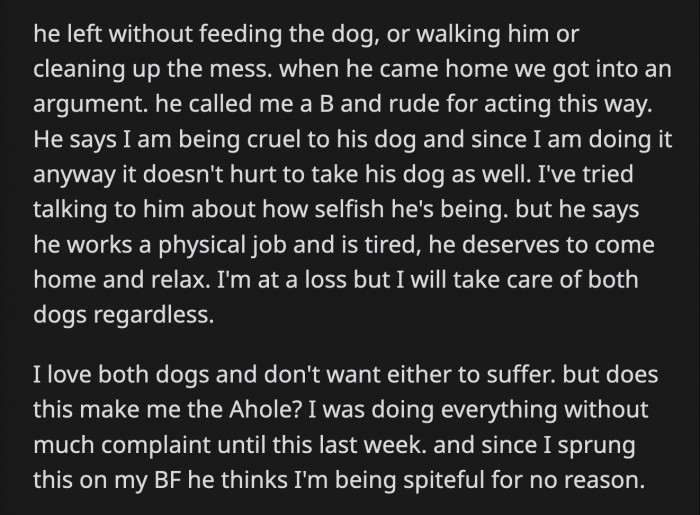
It's not too late for OP to course-correct and leave this lazy man. He doesn't want a GF; he wants a maid who will do everything for him with a sweet smile on her face while he wastes his life in front of the TV.
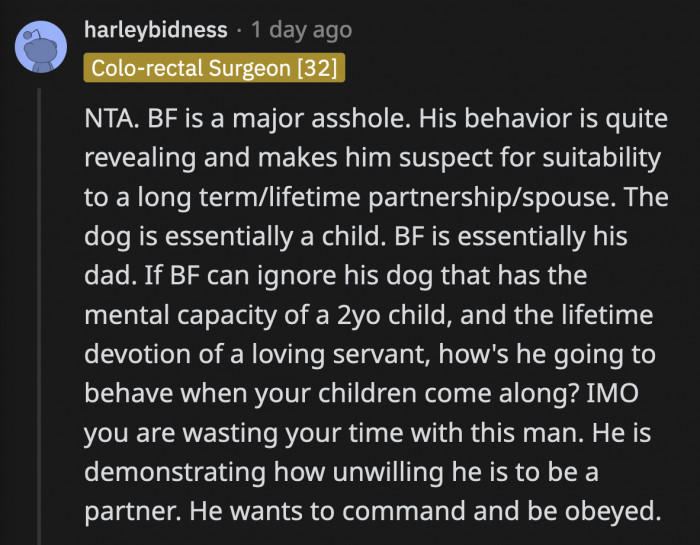
Run far away from this man and never, ever allow yourself to be trapped in a marriage with him, OP!

Conflict in relationships can arise from unmet expectations. According to studies published in the Journal of Marriage and Family, when partners do not communicate their needs, it can lead to feelings of frustration and neglect.
Encouraging open dialogues about responsibilities can help clarify roles and expectations, promoting a healthier relationship dynamic.
In this case, it’s crucial for both partners to engage in honest discussions about their contributions and expectations regarding financial responsibilities and pet care.
This scenario also highlights the concept of emotional labor, where one partner may carry the burden of managing not only their own responsibilities but also those of their partner.
Studies in the Journal of Family Psychology reiterate that this imbalance can lead to significant emotional distress and dissatisfaction in the relationship.
Addressing these dynamics openly can foster healthier interactions and mutual support.
He waited two years to show OP who he really is. He will not get better in a day or in a year.

Leave while you still can, OP

His actions spoke for him, and OP allowed it to happen. She has been allowing him to use her, and it's time she puts a stop to it.
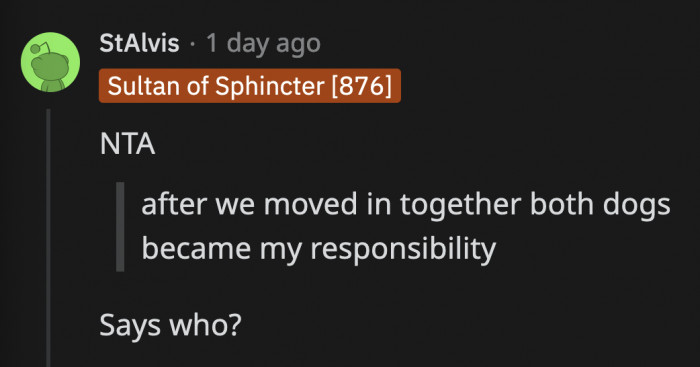
The Importance of Setting Boundaries
Setting boundaries is essential in any relationship, particularly when it comes to financial responsibilities. Research from the American Psychological Association shows that individuals who set clear boundaries are often more satisfied in their relationships.
By discussing financial responsibilities openly, partners can prevent resentment from building up over time, leading to a healthier relational dynamic.
Strategies such as regular check-ins about finances can enhance transparency and reduce tension.
The Importance of Financial Transparency
Financial obligations in relationships can often lead to tension, particularly when one partner feels taken advantage of.
According to research from the American Psychological Association, open discussions about finances are crucial in establishing trust and partnership.
When financial responsibilities are shared transparently, it can reduce feelings of resentment and build a stronger connection.
He's such a catch! Who wouldn't want to be with someone who can't do his chores and wants you to pay for everything?
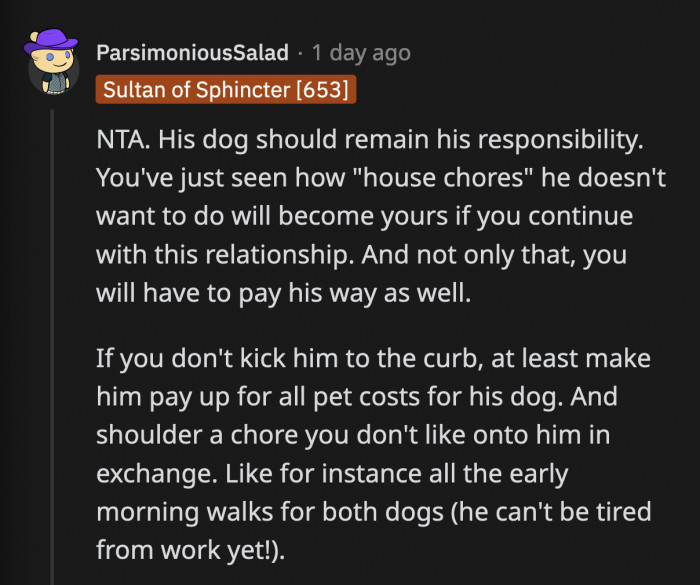
OP told him it was dangerous for her to go on walks alone at night, but he dismissed her and even said she was being paranoid. How lazy is this guy?
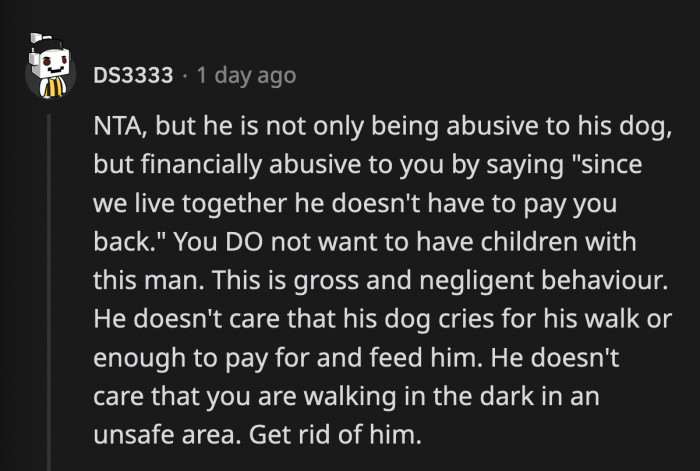
He is a mooch, and OP needs to leave him as soon as she can. He will never see her as his equal.

Power dynamics in relationships can also play a significant role in creating disharmony. Behavioral psychologists note that when one partner assumes a caretaking role, it can lead to feelings of inferiority in the other partner, potentially resulting in avoidance or passive-aggressive behavior.
Addressing these power imbalances through equitable discussions can help restore balance and mutual respect.
It’s important for both partners to feel valued and recognized for their contributions, whether financial or emotional.
Financial disagreements often reflect deeper issues of control and dependency, which can be examined through the lens of attachment theory.
Research suggests that individuals with insecure attachment styles may struggle with financial discussions, fearing vulnerability and judgment.
Understanding these patterns can be pivotal for couples aiming to strengthen their financial and emotional bonds.
Neither OP nor the dog deserve a man who can't exert the most minimum effort.

He says he is too tired after working all day, but he doesn't think OP feels the same way. It doesn't seem like he loves OP enough to worry about her and share responsibilities with her.
He doesn't deserve OP or his dog. He is too lazy to take care of either and even has the audacity to call OP a b*tch for putting a stop to his irresponsibility.
Effective Communication Strategies
Psychologists recommend establishing clear communication strategies to address imbalances in responsibilities.
Utilizing 'I' statements can be particularly effective in expressing feelings without assigning blame, making it easier for both partners to engage in constructive dialogue.
For example, saying 'I feel overwhelmed with the dog care' can open up a conversation about shared responsibilities without triggering defensiveness.
Additionally, setting regular check-ins can help partners reassess their roles and responsibilities as circumstances change.
Research from the Journal of Marriage and Family shows that couples who engage in regular communication tend to report higher relationship satisfaction.
Creating an environment where both partners feel heard and valued can significantly enhance the relationship.
Psychological Analysis
This situation exemplifies the challenges that arise when partners have differing expectations regarding responsibilities. When one person feels overburdened, it can lead to resentment and conflict, highlighting the importance of clear communication and shared decision-making.
Analysis generated by AI
Analysis & Alternative Approaches
The dynamics of shared responsibilities in relationships can be complex, particularly when financial and caregiving roles are involved.
According to research from the National Institute of Mental Health, open communication and mutual support are essential for navigating these challenges.
Couples who proactively address and renegotiate their roles tend to foster stronger bonds and greater satisfaction.
Practical Approaches to Conflict Resolution
Effective conflict resolution strategies can significantly improve relationship satisfaction. Psychologists suggest techniques such as active listening and “I” statements to express feelings without assigning blame.
By focusing on one’s own experiences rather than accusing the partner, couples can foster a more constructive dialogue.
Implementing these strategies could help the Redditor and her partner navigate their differences in a more empathetic and effective way.
Financial stress can also take a toll on relationships. Research indicates that financial disagreements are one of the leading causes of relationship breakdowns.
Establishing a joint budgeting system can alleviate some of this pressure, ensuring both partners feel involved and accountable for shared expenses.
Being transparent about finances and creating a plan together can help reinforce teamwork and mutual support.
Analysis & Alternative Approaches
In conclusion, understanding relationship dynamics through a psychological lens can provide valuable insights for couples facing challenges. Research consistently shows that open communication and boundary-setting are crucial for maintaining healthy partnerships. By fostering these skills, individuals can promote a more equitable and fulfilling relationship.



